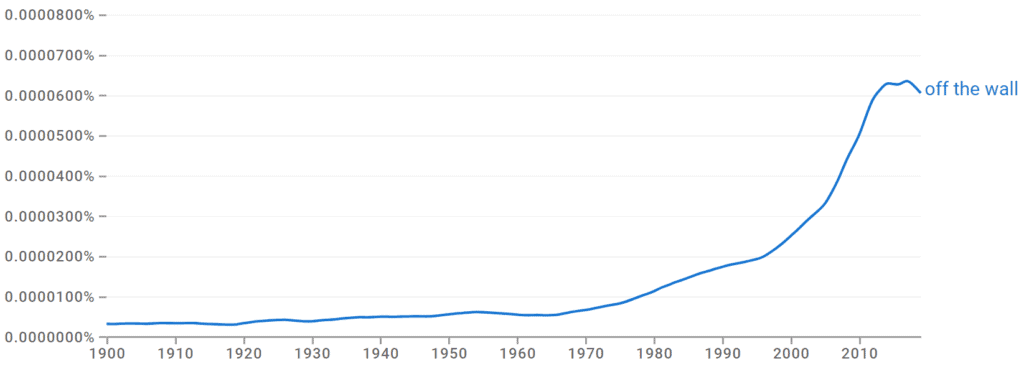The idiom off the wall means that something is being described as odd or abnormal. It can be referring to an event, behavior, or even something somebody said. The origins of this idiom are not well known, but it became popular in the 1960s in America and is considered slang for the time period.
Idioms are fun and descriptive figures of speech that help connect the author’s message and the audience. They often derive from a literal meaning but, through the years (or centuries), have taken on a different connotation.
So, read on to learn more about this idiom’s meaning, origins, and usage through the examples below.
What Is the Meaning of ‘Off the Wall’?

Off the wall is an idiom that describes something that stands out, not merely because it’s different, but often because it challenges our regular patterns of thought. This phrase is a nod to the unexpected twists and turns of life, reminding us that the irregularities often hold the most fascination. While commonly used to denote something strange or bizarre, it’s also an acknowledgment of the creativity and originality that break the monotony of the norm. In embracing the “off the wall,” we celebrate the diversity and unpredictability that make life so rich and varied.
Is ‘Off the Wall’ Hyphenated?
When a phrase is used as an adjective to modify a noun, it should be hyphenated to indicate the relationship between the words.
For example:
- I went to a party last weekend with the most off-the-wall theme—everyone had to dress as their favorite meme!
Using ‘Off the Wall’ in Sentences

- That movie last night was totally off the wall; I’ve never seen anything like it.
- Some of Jake’s suggestions are a bit off the wall, but they often bring a fresh perspective.
- Whenever I need an off-the-wall solution to a problem, I turn to my creative friend, Mia.
- Did you hear Sarah’s off-the-wall idea about hosting a picnic on the rooftop? It might just be quirky enough to work!
- Sometimes, I enjoy watching those off-the-wall indie films that make you question reality.
Off the Wall Origins

Synonymous with “unorthodox or unconventional,” “off the wall” was first recorded in the 1960s and may have integrated into everyday speech as part of the high school cultural slang of the time.
The phrase might suggest doing things differently or not following rules. But, this theory is as good as any since no true documentation of its inception exists.
Some also think “off the wall” could be related to “bouncing off the walls,” which means acting wild or super energetic. However, its exact roots are a bit of a mystery.
Let’s Review
The phrase “off the wall” means something is unusual or not what you’d typically expect. It’s often used to talk about things that are strange or don’t follow the norm.
When you use “off the wall” as an adjective before a noun, remember to hyphenate it, like “off-the-wall idea.”
Check out some others we covered:
